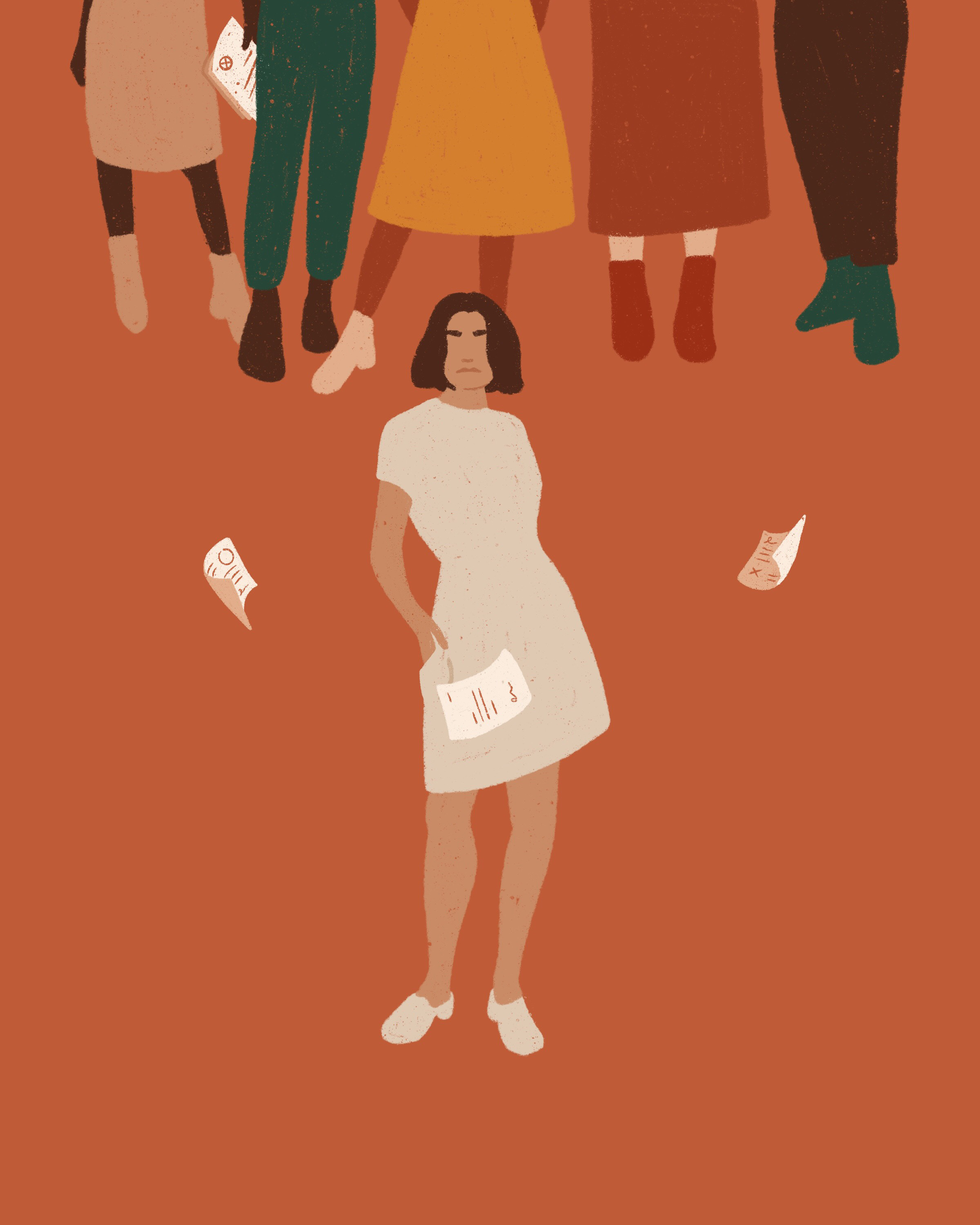NEW RULES
Has #MeToo changed the way we behave at work?
by Kylie Adair
Five years ago, Erin Gee had worked her way into an exciting role working closely with executives on a youth network in the public sector. After spending a year doing that work she moved on to another role in the same organization, but kept in touch, cordially, with her former colleagues.
Illustration by Samantha Nickerson •
But one day, after a tweet about a particular new restaurant in the city, the man—who was married—sent her something along the lines of, “I want to go soon too. I’ll need a partner in crime, though.”

Gee was shocked, but more than that she was confused. His proposal felt inappropriate, but maybe he was simply interested in mentoring her. Or friendship. Maybe she was overreacting, misreading the situation. Maybe she’d invited this advance by replying to his previous messages.
Or—maybe—it was sexual harassment.
“No other middle aged man has asked me in any sort of capacity to go for dinner,” Gee says. “I was very anxious and very stressed and I didn’t know what to do.” After conferring with a friend, she decided to tell her former colleague that her boyfriend wouldn’t be comfortable with their meeting for dinner. She didn’t have a boyfriend at the time.
Gee says in an interview that if this were to happen to her today, she’d feel far more comfortable telling others at work about what happened, entering the exchange into the appropriate process of documentation and making it clear that she felt uncomfortable with the situation, whether or not the man meant to make her feel that way. She regrets not reporting it.
Part of that confidence comes with having more professional experience under her belt now, Gee says, but it’s also a sign of changing times. “Five years ago, we didn’t take harassment as seriously as we do now.”
All this happened in September of 2014, long before the resurgence of #MeToo and long before the reveal of Harvey Weinstein’s widespread abuse sparked a global conversation about sexual harassment at work. This happened to Gee before she had “the correct language” to talk about these things, she tells me.
#MeToo and #TimesUp have given many people, from victims of abuse to people in positions of power, the language to talk about sexual harassment. “The ability to talk freely about sexual discrimination issues was the first change we saw (post-#MeToo) in the workplace and in coaching,” writes Executive Coach Liz Bentley.
And that’s certainly valuable in its own right. But have these wider conversations moved beyond talk? Have they resulted in changes to the kind of workplace culture that for so long has allowed sexual harassment to happen in the first place?
In Canada, a survey of more than 100 people in positions of power within Canadian business found that 53 percent of board members and 66 percent of venture capitalists surveyed have discussed revamping their organizations’ sexual harassment prevention policies in response to the broader conversations happening. An encouraging shift—where these kinds of conversations used to be confined to HR departments, people in leadership are now understanding the need to address the problem head on.
“There’s been much talk about supposed ‘new rules’ at work, and men are apparently unsure of how to interact with the women in their professional circles. ”
The way the public (which, of course, includes members of the workforce) views sexual harassment has changed, too. A Pew Research Center survey from 2018 found that post-the resurgence of #MeToo, there are more Americans (50 percent of those surveyed) who consider men getting away with sexual harassment a major problem than there are those who consider the potential damage to men’s careers via a #MeToo accusation a major problem (34 percent)—a shift away from the Brock Turner-apologist mentality.
But when it comes to concrete action, things are moving slower. Sixty percent of women who responded to a Time Magazine poll said their workplace culture has not changed since #MeToo. An American Psychological Association survey found that just 32 percent of workers’ organizations had implemented new policies around sexual harassment. Of those in the 32 percent, 18 percent said the action their employers took was simply to remind employees of existing sexual harassment policies; 10 percent saw new training or resources added; 8 percent said their organization implemented a more strict harassment policy; and just 7 percent reported a company-wide meeting or town hall to talk about sexual harassment.
At the same time, there’s been much talk about supposed ‘new rules’ at work, and men are apparently unsure of how to interact with the women in their professional circles. Fifty-one percent of men and women surveyed by the Pew Research Center said that #MeToo and #TimesUp conversations have made it more difficult for men to navigate friendly relationships with female colleagues. Only 12 percent said it’s now easier for men to know the boundaries between appropriate interaction and harassment. In one survey, Lean In and Survey Monkey found that the number of men who are uncomfortable with mentoring women has jumped from 5 percent to 16 percent—more than tripling since #MeToo and #TimesUp became international conversations.
Some companies are considering a ban on workplace romantic relationships as a way to avoid the problem altogether, but Gee says she’s not sure that’s the answer. “If someone is interested in (dating), they will let you know,” she says. “The signals will be very clear.” In other words, workplace friendships and romantic relationships aren’t necessarily the issue—they’ve long been a part of workplace culture. The issue, which is arguably the same issue outside of work, is when a sexual or romantic advance is unwanted. In that way, there are no ‘new rules.’ What’s new is the spotlight on those who aren’t following them.
These days, Gee still works in government and also hosts a podcast about current events through an intersectional feminist lens. She says a big part of the boost in her confidence, compared to her mindset when she was harassed in 2014, has come from finding herself among people who lean into the kinds of conversations that #MeToo and #TimesUp have pushed to the forefront—and who take sexual harassment seriously.
“I trust the people around me more than I did at the time,” she says.
Kylie Adair is the editorial director at kaur. space. She has a bachelor’s degree in journalism and human rights and a miniature schnauzer named Dot.









